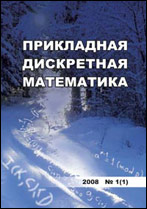|
This article is cited in 4 scientific papers (total in 4 papers)
Mathematical Backgrounds of Informatics and Programming
On generic complexity of the problem of representation of natural numbers by sum of two squares
A. N. Rybalov
Sobolev Institute of Mathematics, Omsk, Russia
Abstract:
Generic-case approach to algorithmic problems was suggested by Miasnikov, Kapovich, Schupp and Shpilrain in 2003. This approach studies behavior of an algorithm on typical (almost all) inputs and ignores the rest of inputs. In this paper, we study the generic complexity of the problem of representation of natural numbers by sum of two squares. This problem, going back to Fermat and Euler, is closely related to the problem of integer factorization and the quadratic residuosity problem modulo composite numbers, for which no efficient algorithms are known. We prove that under the condition of worst-case hardness and $\text{P} = \text{BPP}$, for the problem of representation of natural numbers by sum of two squares there is no polynomial strongly generic algorithm. A strongly generic algorithm solves a problem not on the whole set of inputs, but on a subset, the sequence of frequencies which with increasing size converges exponentially fast to 1. To prove this theorem we use the method of generic amplification, which allows to construct generically hard problems from the problems hard in the classical sense. The main ingredient of this method is a technique of cloning, which unites inputs of the problem together in the large enough sets of equivalent inputs. Equivalence is understood in the sense that the problem is solved similarly for them.
Keywords:
generic complexity, sums of squares, Diophantine equations.
Citation:
A. N. Rybalov, “On generic complexity of the problem of representation of natural numbers by sum of two squares”, Prikl. Diskr. Mat., 2020, no. 48, 93–99
Linking options:
https://www.mathnet.ru/eng/pdm707 https://www.mathnet.ru/eng/pdm/y2020/i2/p93
|

|




 Contact us:
Contact us: Terms of Use
Terms of Use
 Registration to the website
Registration to the website Logotypes
Logotypes








 Citation in format
Citation in format 
